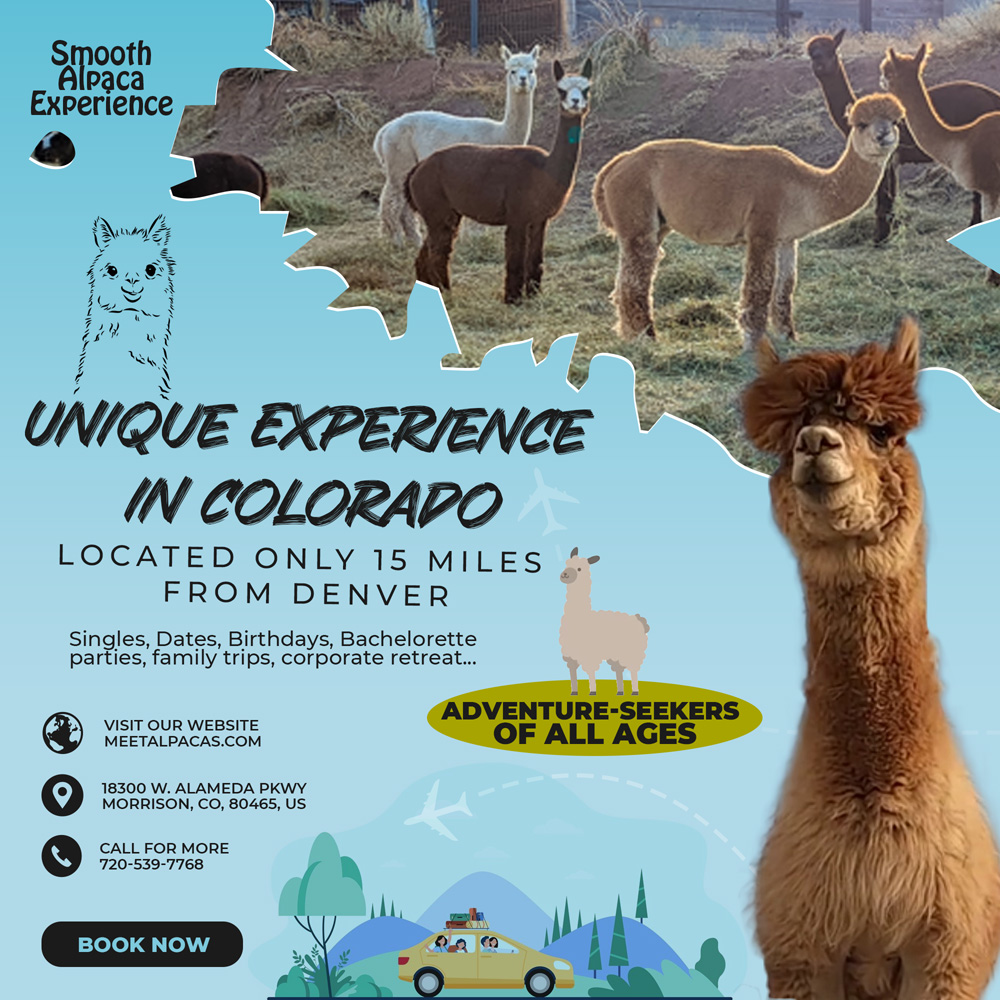Awesome alpaca adventure tours and holiday tricks and tips in Colorado: Alpaca farms offer more than just a chance to get closer to nature; they also promote sustainable farming practices. Alpacas have less impact on the environment than other livestock, largely due to their soft feet that prevent soil compaction and erosion. Their grazing patterns also help to promote biodiversity in pastures, and their manure (nicknamed “alpaca gold”) is a great natural fertilizer. Additionally, alpacas have a longer lifespan and a high reproductive rate, making them a more stable source of revenue for farmers. Read additional info at alpaca adventures in Colorado.

Alpacas have a lot to offer visitors. They are quiet, serene animals that graze peacefully in their pastures and often greet you with gentle nose kisses. They produce soft, silky fiber and are much warmer and stronger than sheep’s wool. They are easy to raise and get along well with other farm animals, making them ideal for hobby farms. They also qualify as livestock, which may allow you to take advantage of tax advantages and incentives.
Here’s why an alpaca experience is perfect for your upcoming trip to Denver. Alpacas are adorable, fluffy, and friendly animals. People are often surprised by just how sociable they are and how much they enjoy human affection. They are also incredibly calm creatures with steady temperaments. This makes them perfect for the whole family. They don’t display erratic behavior, making them more predictable around children.
As herbivores, alpacas only eat vegetation. They eat mostly grass, but their diets can also include leaves wood, bark or stems. Like other ruminants, alpacas have a three-chambered stomach that digests the roughage efficiently. Unlike other grazers, alpacas don’t eat much. According to the Alpaca Owners Association, a 125-lb. (57 kg) animal only eats around 2 lbs. (907 grams) per day. In general, alpacas eat 1.5 percent of their body weight each day.
Additionally, if you love seeing and interacting with animals, an alpaca farm provides a hands-on experience. You can hand-feed your new friends a healthy snack and hang out with them while they provide amusing entertainment. It provides you with the chance to interact with the ranch: Most people don’t know a lot about alpacas before they visit the ranch. Alpacas originate from South America, and they’ve been brought to Colorado over the last several decades. The climate of Colorado is perfect for the alpaca, so they’re content living on ranches in Denver. Are you looking for an educational opportunity for your kids? Come enjoy an alpaca experience that’s not only fun but also informative. This alpaca experience takes place on a fiber farm. This type of farm raises animals like alpacas, sheep, goats, llamas, angora rabbits, and more for their fleece and wool.
What is an alpaca? Alpacas (vicugña pacos) are members of the Camelid Family and are a domesticated species of the South American camelid. Camelids originated in North America over 40 million years ago. Camels migrated east via the Bering Strait and llamas migrated to South America. Today there are five recognized camelids breeds: camels, llamas, guanacos, alpacas, and vicunas. They vary by size and purpose, some being used primarily as pack animals and others valued for their fiber. All are used in a secondary meat market. Camels, llamas, and alpacas have been domesticated for thousands of years, whereas guanacos and vicunas continue to roam freely in herds. Many people are familiar with humped camels: the dromedary of Northern Africa, the Middle East, and Southern Asia, and the Bactrian camel of China and Tibet. Next in size is the llama (domesticated guanaco), followed by the alpaca (domesticated vicuna). Discover extra information at https://meetalpacas.com/.
How much space does it take to raise an alpaca? Alpacas are environmentally friendly and require less pasture and food compared to other livestock. Stocking density impacts the health of the animal, so owners are encouraged to carefully assess their space. Vegetation, access to food and water, and shelter are some factors that influence the amount of space needed. Consult with your local agriculture authorities and breeders for specific recommendations for your area. Are alpacas clean animals? Yes, they are much cleaner than most livestock. Alpacas have a minimal aroma and tend to attract fewer flies in the summertime than other forms of livestock. Alpacas often defecate in communal dung piles. There may be three or four of these areas in a pasture. This makes for easy clean-up, reduced opportunity for parasites, and better overall hygiene in the herd.
Are alpacas easy to train? Alpacas are very smart animals and are fairly easy to train. It is best to start training them when they are young so that they will accept a halter and learn to follow on a lead. Many owners also enjoy training them to walk through obstacles. Some even compete with their alpacas at shows where they walk over, through, and around objects and also jump over small hurdles. Also, it is helpful to train alpacas to ride in a trailer or van if they ever need to be transported to a show or another farm. Alpacas are easy to transport, as they normally cush (lay down with their legs folded under them) when traveling. Be aware that alpacas should not be tied up when traveling.
Alpacas hum; they make a sound like “mmm,” according to Alpaca Ventures. However, they also shriek when danger is present, and make a sound similar to a “wark” noise when excited. Fighting males scream, making a warbling bird-like cry. Alpacas in a herd all use the same area as a bathroom instead of defecating in random areas like many animals do. This behavior helps control parasites, according to the FAO. Males often have cleaner dung piles than females, according to Alpaca Ventures. Females tend to stand in a line and all go at once.